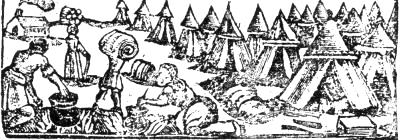
What follows is a contemporary description of the Palatines and of their difficult situation in England in 1709 and 1710, while they were awaiting transport to the New World. The anonymous author writes of Blackheath and Camberwell, locations near London where most of the Palatines were encamped. He also refers to St. Mary’s Lutheran Church in the Savoy, where those of the Lutheran confession sought spiritual refuge during these trying days. This description is excerpted from The State of the Palatines for Fifty Years Past to This Present Time, published in 1710 and reprinted in Ecclesiastical Records of the State of New York, Vol. III (Albany, New York: J. B. Lyon Company, 1902), pp. 1820-31. The quoted portion is from p. 1831.
There are now some thousands of them lodged in tents at Black Heath and Camberville, where they spend their time very religiously and industriously, hearing Prayers morning and evening, with singing of Psalms and preaching every Sunday, where both old and young appear very serious and devout.
Some employ themselves by making several toys of small value, which they sell to the multitudes that come daily to see them. They are contented with very ordinary food, their bread being brown and their flesh meat of the coarsest and cheapest sort, which with a few roots and herbs they eat with much cheerfulness and thankfulness; great numbers of them go every Sunday to their church in the Savoy, and receive the sacrament of their own ministers.
Many of the younger are married every week, the women weaving Rosemary and the men Laurel in their hair at the time of marriage. Adultery and fornication being much abhorred by them.
When any are buried, all the attendants go singing after the corpse, and when they come to the grave, the coffin is opened for all to see the body; after that it is laid in the ground, they sing again for some time, and then depart. They carry grown people upon a bier, and the children upon their heads.
So that in the whole, they appear to be an innocent, laborious, peaceable, healthy and ingenious people; and may be rather reckoned a blessing than a burden to any Nation where they shall settle.

Return to the Lutheran Heritage Web Site Home Page